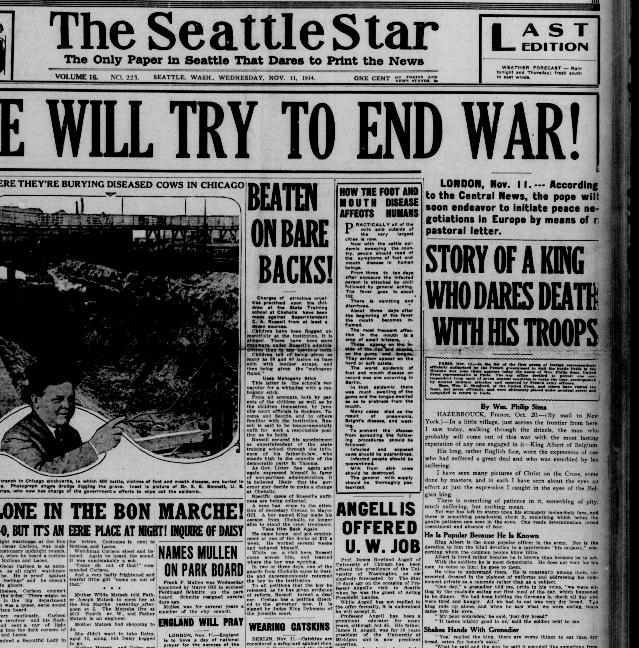|
Moderated by NW Okie! |
Volume 16 , Issue 382014Weekly eZine: (366 subscribers)Subscribe | Unsubscribe Using Desktop... |
100 Years Ago, 11 Nov. 1914, Wednesday

One hundred years ago today, 11 November 1914, on a Wednesday, The Seattle Star, Seattle, Washington, had the front page headlines that read, Pope Will Try To End War!. London, Nov. 11 (1914) -- According to the Central News, the pope would soon endeavor to initiate peace negotiations in Europe by means of a pastoral letter. The sub-headlines read, Story Of A King Who Dares Death With His Troops.
Paris, Nov. 11 (1914) -- In the list of the first group of foreign correspondents officially authorized by the French government to visit the battle fields in the Western war zone there appeared the name of Wm. Philip Sims, United Press representative in Paris. The war office decided to permit one correspondent from each of seven central countries to make the tour, accompanied by neutral military attaches and escorted by French army officers. Sims, Wm. G. Shepard, of the United Press, and others had visited the front, but never officially, and were ultimately placed under nominal arrest and compelled to return to Paris.
Hazebrouck, France, 20 Oct. (1914), by Wm. Philip Sims -- (by mail to New York.) -- "In a little village, just across the frontier from here, I saw today, walking through the drizzle, the man who probably will come out of this war with the most lasting reputation of any one engaged in it ... King Albert of Belgium.
"His long, rather English face, wore the expression of one who had suffered a great deal and who was ennobled by his suffering.
"I have seen many pictures of Christ on the Cross, some done by masters, and in each I have seen about the eyes an effort at just the expression I caught in the eyes of the Belgian king.
"There is something of patience in it, something of pity, much suffering, but nothing mean.
"Yet war has left its stamp upon his strangely melancholy face, and there is something paradoxical about it, something which belies the gentle patience one sees in the eyes. One reads determination, proud resentment and absence of fear."
The article goes on to say that King Albert was the most popular officer in the army. Nor is the devotion to him the blind devotion to a mysterious "his Majesty," concerning whom the common people know little.
Albert was loved rather because he was known than because he was not. With soldiers he was most democratic. He did not wait for his men to come to him. He went to them. He tried to understand them. He was constantly among them, unescorted, dressed in the plainest of uniforms and addressing his commonest private as a comrade rather than as a subject.
In 1914, Wm Philip Sims wrote: "One day," a grenadier told me, pride in his voice, "we were sitting by the roadside eating our first meal of the day, which happened to be dinner. We had been holding the Germans in check all day and were tired and hungry. All we had to eat was very dry bread. The king rode up alone, and when he saw what we were eating, tears came into his eyes.
"'My poor comrades,' he said, 'just dry bread?'
"'It tastes mighty good to us,' said the soldier next to me.'
"'Yes,' replied the king, 'there are worse things to eat than dry bread, eaten for honor's sake.'
"What he said and the way he said it sounded like something from the bible. Nobody spoke a word. Nobody shouted 'Long live the king.' or anything like that. But the man who had said dry bread tasted good walked up to the king and held out his hand. The king took it quickly and shook it hard. The man fell back, wiping his eyes.
"Then the whole group crowded about and shook the king's hand. He seemed happier as he rode away.
"'Belgium cannot die as long as she has men like you,' he said.
"'Nor while she has a king like you,' everybody shouted.
"Then we all cried, 'Vive le roi!'"
This was typical of what one heard, mingling with the Belgian soldiers.
Sims wrote, "I understand the king has shown disfavor to more than one officer for lack of interest in the soldiers. In Antwerp, the men told me, he often visited cafes alone and sent to their quarters officers he found drinking in them. Poor, tried and suffering Belgium! Much bigger kingdoms had had much smaller kings."
| View or Add Comments (0 Comments)
| Receive
updates ( subscribers) |
Unsubscribe
| © . Linda Mcgill Wagner - began © 1999 Contact Me | |
